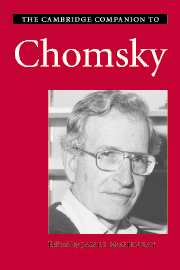Book contents
- Frontmatter
- Introduction
- Part I Chomsky on the human language
- Part II Chomsky on the human mind
- Part III Chomsky on values and politics
- 11 Market values and libertarian socialist values
- 12 The individual, the state, and the corporation
- 13 Noam Chomsky: the struggle continues
- 14 The responsibility of the intellectual
- Notes
- References
- Index
11 - Market values and libertarian socialist values
from Part III - Chomsky on values and politics
Published online by Cambridge University Press: 28 May 2007
- Frontmatter
- Introduction
- Part I Chomsky on the human language
- Part II Chomsky on the human mind
- Part III Chomsky on values and politics
- 11 Market values and libertarian socialist values
- 12 The individual, the state, and the corporation
- 13 Noam Chomsky: the struggle continues
- 14 The responsibility of the intellectual
- Notes
- References
- Index
Summary
Many observers have been fascinated by the puzzle of tracing connections between Noam Chomsky’s extraordinary contributions to two quite distinct domains of modern culture. Ronald Lunsford points out that some of these parallels would exist whatever area of inquiry Chomsky had chosen for his life’s work - parallels that “arise from Chomsky’s way of thinking, rather than from the disciplines themselves” (Haley & Lunsford; 1994: 172). One critical element in his “way of thinking” manifest in both his professional and non-professional work is his commitment to rationality (a commitment summed up in the observation, “There are no arguments that I know of for irrationality” [Chomsky 1987a:22]). On a more abstract level, one finds in both his political and his non-political work a quality that Chomsky has sometimes referred to as “psychic distance.” In linguistics, “if we can establish a kind of psychic distance from the object and try to see how similar normal common characteristics really are, against the background of a possible variety that can be imagined,” we discover that “language structures really are uniform” (1988a: 151f). In politics, once we have extricated ourselves from conventional thought, we discover underlying similarities between apparent polarities - an underlying commitment to US power shared by, for example, Joseph Alsop (a Vietnam War “hawk”), and Arthur Schlesinger (a Kennedy liberal and a “dove”). The ability to achieve “psychic distance ” is actually an essential element of the ability to inquire, and to achieve scientific progress.
- Type
- Chapter
- Information
- The Cambridge Companion to Chomsky , pp. 225 - 239Publisher: Cambridge University PressPrint publication year: 2005
- 2
- Cited by

